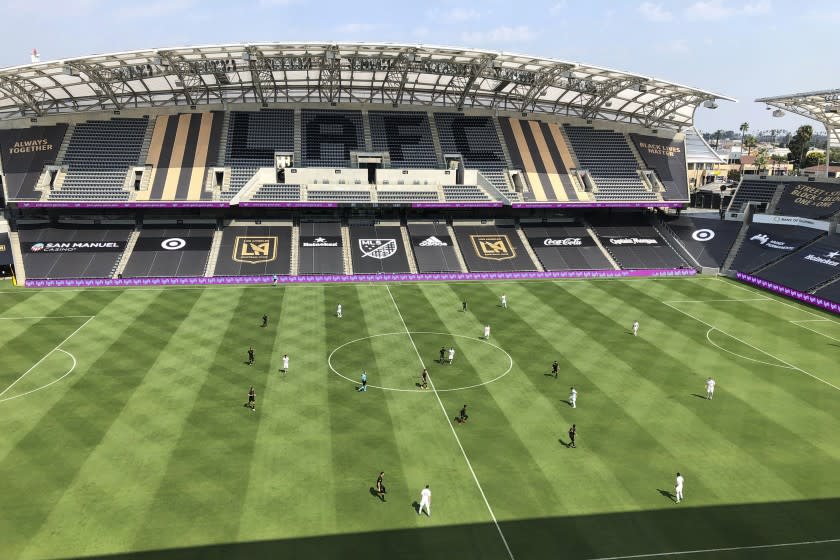LAFC vs. Galaxy: How many El Tráficos are too many for one season?

When the Galaxy and LAFC face off Sunday in an empty Banc of California Stadium, it will mark the fourth time the MLS neighbors have played one another this season — in fewer than 20 games.
And that begs a question: Can the most passionate rivalry in Southern California professional sports retain its fervor if the teams meet more often than the local Kiwanis club?
“A traditional number of matchups between the two would always be preferred. But I sense four is better than none — which very easily could have been the case given COVID," said David M. Carter, an associate professor of sports business at the USC Marshall School of Business and a principal at the Sports Business Group, a consulting firm.
Indeed the pandemic nearly wiped out the season, then forced the league to draw a revised schedule based on geography rather than competitive balance. Add in long postseason runs by the Lakers and Dodgers and staging multiple El Tráficos, as the rivalry is known, was the best way to keep MLS relevant in Southern California, Carter said.
"Playing such a high percentage of games against one another is not ideal in terms of delivering on scarcity and hype,” he said. “But given the current climate, frequency may help to keep the local teams a little more top of mind.”
Alexi Lalas, who played for four MLS teams, was an executive with three and has covered the league as an analyst for ESPN and Fox Sports, believes that’s the wrong question. The better one, he said, is what choice did MLS have?
“This was an effort to make a crap situation better. It wasn’t about finding an ideal or a perfect solution or having all the answers,” he said. “This was about an unprecedented time and doing everything possible, from a competitive and programming perspective, to give people what they want.”
Both teams are expected to have important players return from international duty Sunday.
Midfielder Jonathan dos Santos and defender Rolf Feltscher will be back for the Galaxy (5-9-3), who are last in the Western Conference but entered the weekend just three points out of a playoff berth.
LAFC (7-7-4) will welcome four starters in forwards Diego Rossi and Brian Rodríguez, midfielder José Cifuentes and defender Diego Palacios. Forward Carlos Vela, the reigning league MVP, could get limited minutes off the bench after missing two months with an MCL strain but midfielder Mark-Anthony Kaye and defender Andy Najar remain unavailable because of injuries.
The first El Tráfico of the season came during group play of the MLS Is Back tournament in Orlando. When the teams returned to their home markets to finish the schedule, the league limited teams to road trips that could be completed in a day. With the Galaxy and LAFC separated by less than a dozen miles, it made sense for them to play multiple times.
“It’s out of necessity. There’s a practical reality to what is going on,” Lalas said. “I don’t think it’s going to diminish the rivalry because I think it will be kind of encased in this time, these ones. They will be looked at as just different versions of the rivalry.”
The games certainly have been different. In the first six El Tráficos, the teams scored 13 times each and just one game was decided by more than a goal. The last three saw LAFC score a franchise-record six goals in a 6-2 win followed by dominant Galaxy shutout victories, 2-0 and 3-0.
The absence of a crowd might be one reason for the change. That has taken away much of the rivalry’s electricity and emotion, and forced fans to contain their vitriol to social media. The teams’ familiarity with one another also has taken away some of the uniqueness of the rivalry.
“Does it get old playing the same team and players over and over again even if it’s your major rival? Yes,” Lalas said. “But when you talk to the players, they understand the situation.”
This story originally appeared in Los Angeles Times.


